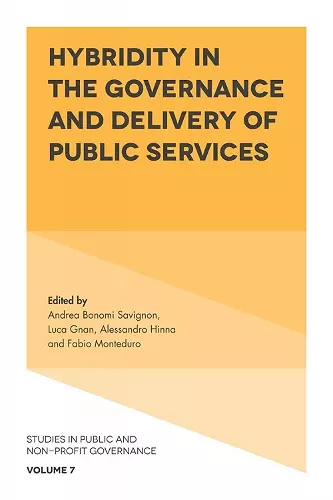Hybridity in the Governance and Delivery of Public Services
Luca Gnan editor Fabio Monteduro editor Alessandro Hinna editor Andrea Bonomi Savignon editor
Format:Hardback
Publisher:Emerald Publishing Limited
Published:31st May '18
Currently unavailable, and unfortunately no date known when it will be back

The concept of hybridity, although well developed in various research areas, is relatively new in the management field, where “organisational hybridity” refers to organisations that combine managerial features, value systems and institutional logics of different sectors (market, state, civil society). Hybrid organisations have traditionally been compared with private, public and non-profit ones, by considering goal ambiguity, governance, organisational structures, personnel and purchasing processes, and work-related attitudes and values. This research has led to substantial evidence on relevant differences between hybrid and other organisations. Hybridisation has also become a permanent feature in today’s welfare system. New Public Management and welfare state reforms of the mid 1990s contributed to the emergence of hybrid organisations, with neo-institutional theory also attributed to this phenomenon.
Considering the hybrid phenomenon as a whole, little is known about governance and controls, especially with regard to accountability mechanisms and issues such as the prevention of corruption. Even less is known when we consider the main variables of hybridity to be mixed ownership, competing institutional logics, multiplicity of funding arrangements, and public and private forms of financial and social control.
This book seeks to answer the unsolved questions related to hybrid organisations. It does so by adopting a multifaceted approach along its ten chapters, which focus on different national contexts, including the UK, Italy, Australia, and Sweden, as well as global organisations. The authors consider policy sectors including humanitarian aid, local transport, healthcare, and welfare services.
This work unites international contributors in management law, organizational behavior, public management, business administration, economics, and accounting. They address issues and unresolved questions related to hybrid organizations that mix public and private elements to deliver public goods and services. Hybrid organizations are defined as organizations that combine managerial features, value systems, and institutional logics of different sectors, such as market, state, and civil society. Themes of the book include accountability and transparency, sector-specific challenges, and nonprofit governance. Examples and cases are presented from different national contexts and policy sectors. Some specific topics include the influence of human resources practices on corruption behavior in humanitarian aid, public management and hybridity in healthcare, strategic philanthropy in foundations, and collaboration between for-profit and non-profit organizations. -- Annotation ©2018 * (protoview.com) *
ISBN: 9781787437708
Dimensions: unknown
Weight: 488g
288 pages